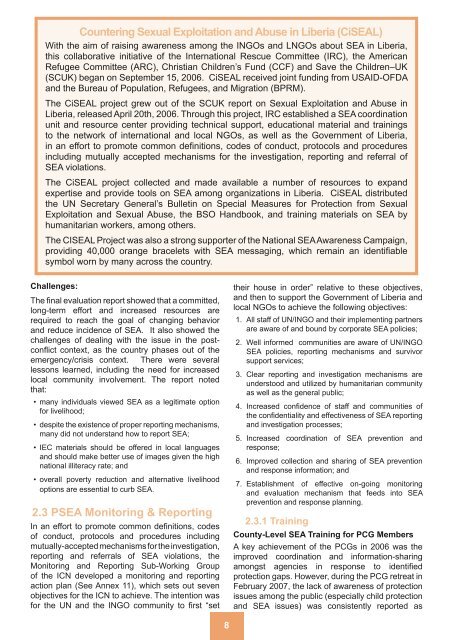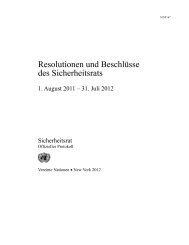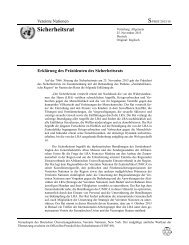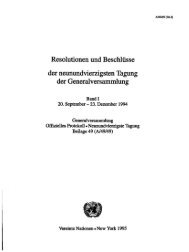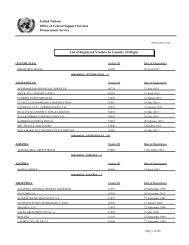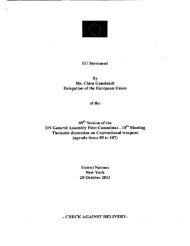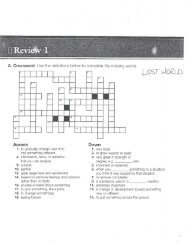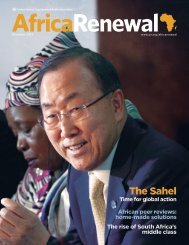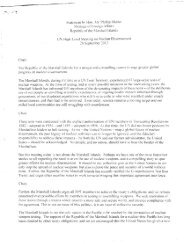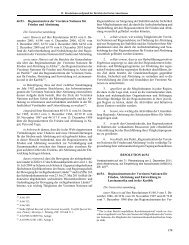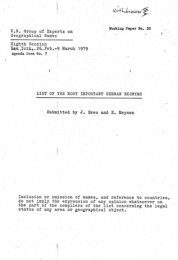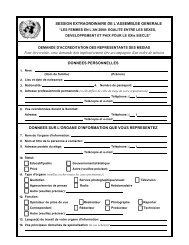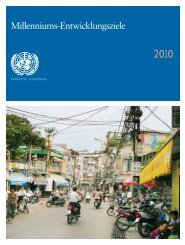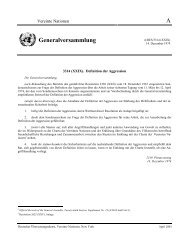Prevention and Response to Sexual Exploitation & Abuse in Liberia
Prevention and Response to Sexual Exploitation & Abuse in Liberia
Prevention and Response to Sexual Exploitation & Abuse in Liberia
Create successful ePaper yourself
Turn your PDF publications into a flip-book with our unique Google optimized e-Paper software.
Counter<strong>in</strong>g <strong>Sexual</strong> <strong>Exploitation</strong> <strong>and</strong> <strong>Abuse</strong> <strong>in</strong> <strong>Liberia</strong> (CiSEAL)<br />
With the aim of rais<strong>in</strong>g awareness among the INGOs <strong>and</strong> LNGOs about SEA <strong>in</strong> <strong>Liberia</strong>,<br />
this collaborative <strong>in</strong>itiative of the International Rescue Committee (IRC), the American<br />
Refugee Committee (ARC), Christian Children’s Fund (CCF) <strong>and</strong> Save the Children–UK<br />
(SCUK) began on September 15, 2006. CiSEAL received jo<strong>in</strong>t fund<strong>in</strong>g from USAID-OFDA<br />
<strong>and</strong> the Bureau of Population, Refugees, <strong>and</strong> Migration (BPRM).<br />
The CiSEAL project grew out of the SCUK report on <strong>Sexual</strong> <strong>Exploitation</strong> <strong>and</strong> <strong>Abuse</strong> <strong>in</strong><br />
<strong>Liberia</strong>, released April 20th, 2006. Through this project, IRC established a SEA coord<strong>in</strong>ation<br />
unit <strong>and</strong> resource center provid<strong>in</strong>g technical support, educational material <strong>and</strong> tra<strong>in</strong><strong>in</strong>gs<br />
<strong>to</strong> the network of <strong>in</strong>ternational <strong>and</strong> local NGOs, as well as the Government of <strong>Liberia</strong>,<br />
<strong>in</strong> an effort <strong>to</strong> promote common def<strong>in</strong>itions, codes of conduct, pro<strong>to</strong>cols <strong>and</strong> procedures<br />
<strong>in</strong>clud<strong>in</strong>g mutually accepted mechanisms for the <strong>in</strong>vestigation, report<strong>in</strong>g <strong>and</strong> referral of<br />
SEA violations.<br />
The CiSEAL project collected <strong>and</strong> made available a number of resources <strong>to</strong> exp<strong>and</strong><br />
expertise <strong>and</strong> provide <strong>to</strong>ols on SEA among organizations <strong>in</strong> <strong>Liberia</strong>. CiSEAL distributed<br />
the UN Secretary General’s Bullet<strong>in</strong> on Special Measures for Protection from <strong>Sexual</strong><br />
<strong>Exploitation</strong> <strong>and</strong> <strong>Sexual</strong> <strong>Abuse</strong>, the BSO H<strong>and</strong>book, <strong>and</strong> tra<strong>in</strong><strong>in</strong>g materials on SEA by<br />
humanitarian workers, among others.<br />
The CISEAL Project was also a strong supporter of the National SEA Awareness Campaign,<br />
provid<strong>in</strong>g 40,000 orange bracelets with SEA messag<strong>in</strong>g, which rema<strong>in</strong> an identifiable<br />
symbol worn by many across the country.<br />
Challenges:<br />
The f<strong>in</strong>al evaluation report showed that a committed,<br />
long-term effort <strong>and</strong> <strong>in</strong>creased resources are<br />
required <strong>to</strong> reach the goal of chang<strong>in</strong>g behavior<br />
<strong>and</strong> reduce <strong>in</strong>cidence of SEA. It also showed the<br />
challenges of deal<strong>in</strong>g with the issue <strong>in</strong> the postconflict<br />
context, as the country phases out of the<br />
emergency/crisis context. There were several<br />
lessons learned, <strong>in</strong>clud<strong>in</strong>g the need for <strong>in</strong>creased<br />
local community <strong>in</strong>volvement. The report noted<br />
that:<br />
• many <strong>in</strong>dividuals viewed SEA as a legitimate option<br />
for livelihood;<br />
• despite the existence of proper report<strong>in</strong>g mechanisms,<br />
many did not underst<strong>and</strong> how <strong>to</strong> report SEA;<br />
• IEC materials should be offered <strong>in</strong> local languages<br />
<strong>and</strong> should make better use of images given the high<br />
national illiteracy rate; <strong>and</strong><br />
• overall poverty reduction <strong>and</strong> alternative livelihood<br />
options are essential <strong>to</strong> curb SEA.<br />
2.3 PSEA Moni<strong>to</strong>r<strong>in</strong>g & Report<strong>in</strong>g<br />
In an effort <strong>to</strong> promote common def<strong>in</strong>itions, codes<br />
of conduct, pro<strong>to</strong>cols <strong>and</strong> procedures <strong>in</strong>clud<strong>in</strong>g<br />
mutually-accepted mechanisms for the <strong>in</strong>vestigation,<br />
report<strong>in</strong>g <strong>and</strong> referrals of SEA violations, the<br />
Moni<strong>to</strong>r<strong>in</strong>g <strong>and</strong> Report<strong>in</strong>g Sub-Work<strong>in</strong>g Group<br />
of the ICN developed a moni<strong>to</strong>r<strong>in</strong>g <strong>and</strong> report<strong>in</strong>g<br />
action plan (See Annex 11), which sets out seven<br />
objectives for the ICN <strong>to</strong> achieve. The <strong>in</strong>tention was<br />
for the UN <strong>and</strong> the INGO community <strong>to</strong> first “set<br />
8<br />
their house <strong>in</strong> order” relative <strong>to</strong> these objectives,<br />
<strong>and</strong> then <strong>to</strong> support the Government of <strong>Liberia</strong> <strong>and</strong><br />
local NGOs <strong>to</strong> achieve the follow<strong>in</strong>g objectives:<br />
1. All staff of UN/INGO <strong>and</strong> their implement<strong>in</strong>g partners<br />
are aware of <strong>and</strong> bound by corporate SEA policies;<br />
2. Well <strong>in</strong>formed communities are aware of UN/INGO<br />
SEA policies, report<strong>in</strong>g mechanisms <strong>and</strong> survivor<br />
support services;<br />
3. Clear report<strong>in</strong>g <strong>and</strong> <strong>in</strong>vestigation mechanisms are<br />
unders<strong>to</strong>od <strong>and</strong> utilized by humanitarian community<br />
as well as the general public;<br />
4. Increased confidence of staff <strong>and</strong> communities of<br />
the confidentiality <strong>and</strong> effectiveness of SEA report<strong>in</strong>g<br />
<strong>and</strong> <strong>in</strong>vestigation processes;<br />
5. Increased coord<strong>in</strong>ation of SEA prevention <strong>and</strong><br />
response;<br />
6. Improved collection <strong>and</strong> shar<strong>in</strong>g of SEA prevention<br />
<strong>and</strong> response <strong>in</strong>formation; <strong>and</strong><br />
7. Establishment of effective on-go<strong>in</strong>g moni<strong>to</strong>r<strong>in</strong>g<br />
<strong>and</strong> evaluation mechanism that feeds <strong>in</strong><strong>to</strong> SEA<br />
prevention <strong>and</strong> response plann<strong>in</strong>g.<br />
2.3.1 Tra<strong>in</strong><strong>in</strong>g<br />
County-Level SEA Tra<strong>in</strong><strong>in</strong>g for PCG Members<br />
A key achievement of the PCGs <strong>in</strong> 2006 was the<br />
improved coord<strong>in</strong>ation <strong>and</strong> <strong>in</strong>formation-shar<strong>in</strong>g<br />
amongst agencies <strong>in</strong> response <strong>to</strong> identified<br />
protection gaps. However, dur<strong>in</strong>g the PCG retreat <strong>in</strong><br />
February 2007, the lack of awareness of protection<br />
issues among the public (especially child protection<br />
<strong>and</strong> SEA issues) was consistently reported as


